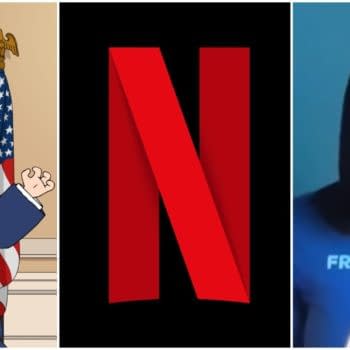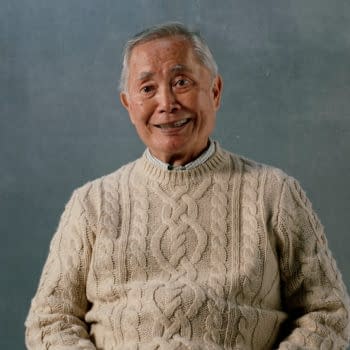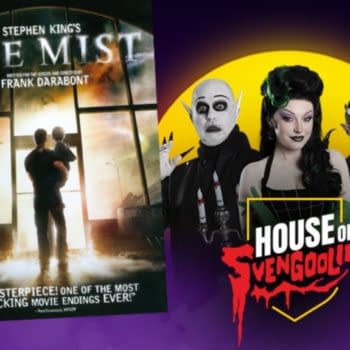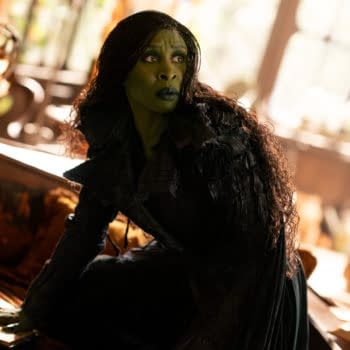Posted in: Movies | Tagged: Andrew Hodges, charles dance, entertainment, film, Graham Moore, Kiera Knightly, matthew goode, morten tyldum, rory kinnear, The Imitation Game
The Imitation Game – Cumberbatch Faces Down A Fascist Armageddon
By Chris Maltby
The Imitation Game, in its original definition, is a party game. A man and a woman go into separate rooms and then guests attempt to tell them apart by asking a series of questions, and both the man and woman send out a series of answers with the specific intention of convincing the participants that one is actually the other. It was from this parlour game that pioneering mathematician, logician and cryptanalyst Alan Turing took the name, applying it to his research into artificial intelligence, devising a series of questions to see if a computer's ability to think is indistinguishable, or clearly separate from that of a human being.
In director Morten Tyldum's version of 'Game', adapted from Andrew Hodges' biography of Turing, and starring Benedict Cumberbatch in the lead role, the titular game takes on many forms. Preconceived ideas of who or what a person is or can be and the way they present themselves, run tandem to covert motivations, and the secret codes and hidden meanings embedded in the subject of Turing's work develop additional dimensions when viewed alongside the convoluted and contrarian interactions between human beings, friends and enemies.
Set during the darkest days of World War II, 'Game' follows the recruitment of Turing into Great Britain's Government Code and Cypher School at Bletchley Park. There, with a group of England's leading young minds, Turing must learn to work alongside his presumed peers to decipher the Nazi's Enigma Code, the unbreakable cipher that had given Germany an almost indomitable edge during the war.
The film collapses time, bouncing back and forth through three distinct periods in Turing's life, touching on his early, intensely formative years at boarding school, and flashing through the wartime era to the 1950's, where a detective, played by the great Rory Kinnear, suspicious of this seemingly errant professor, seeks to uncover the truth behind whatever it is he might be hiding. Those familiar with Turing's history are well aware of what this secret is , and, to its credit, the film does not present Turing's violations of the Victorian-era Labouchere Amendment as a bombastic dramatic reveal. Cumberbatch's portrayal of Turing is a thrum of squirrely restlessness, a focused intensity that sacrifices a sense of being in the world while aloofly set apart from it. Though there may have been trepidation that Cumberbatch would bring too much of his Spectrum-skirting Sherlock to the role of Turing, that thought recedes as Cumberbatch dissapears into the skin of Turing, playing him less as a bombastic genius and more of a reluctant savant, unsure of how to interact in a world where the rules are so clearly different to his specialized fields.
Screenwriter Graham Moore's script, which crowned the annual Black List in 2011, while never achieving the distinction of being subtle, is oftentimes funny, witty and sharp, and allows ample opportunity for the supporting cast to show their mettle. An early opening scene between Turing and Charles Dance as the military head of Bletchley, is a deft battle of wills and words, evocative of Dance's recent work on Game of Thrones. Mark Strong, as Maj. Gen. Stewart Menzies, Bletchley's liaison to MI6, essentially performs a test run for his inevitable casting as M in the Bond franchise, perfectly balancing the actors signature mix of humor, mystery and subtle malevolence. The rest of the cast is uniformly fantastic, from a reserved Kiera Knightley as Joan Clarke, Turing's friend and eventual fiance, to Matthew Goode's initially reluctant co-worker and eventual confederate, but never rise above the limitations of a script which provides only passing nods to the bleakness of its true story.
Tyldum, who brought an unnerving grittiness to his 2011 Norwegian hit Headhunters, instead goes for a far more lavish look with Game, opting for less director-ly flourishes and more Masterpiece Theatre-esque established staging. The look of the film, lensed by Óscar Faura, cinematographer for The Impossible, is rich; lush and vibrant, lending the film a fleshed out vividness, a portrayal of wartime Britain that, like the script, avoids any of the grittiness of the reality of an England facing down the spectre of fascist armageddon.
By the third time the films apparent mantra is repeated, its heavy handedness has become a bludgeon that threatens to demolish the scaffolding the film has assembled up to that point. While its inevitable devolution into cliche ridden Oscar bait is unfortunate, for the majority of it's time The Imitation Game is an engaging look into one of WWII's most fascinating secret histories, and a telling indictment of how, even when doing their part to rescue us from the agents of our worst selves, our tolerance for unconventional heroes who both think and act outside of the box is historically, shamefully limited.
Chris Maltby is an NYC based street walkin' cheetah with a heart full of napalm.
You can find him on Twitter @TheMovieFilth if you dare.


















